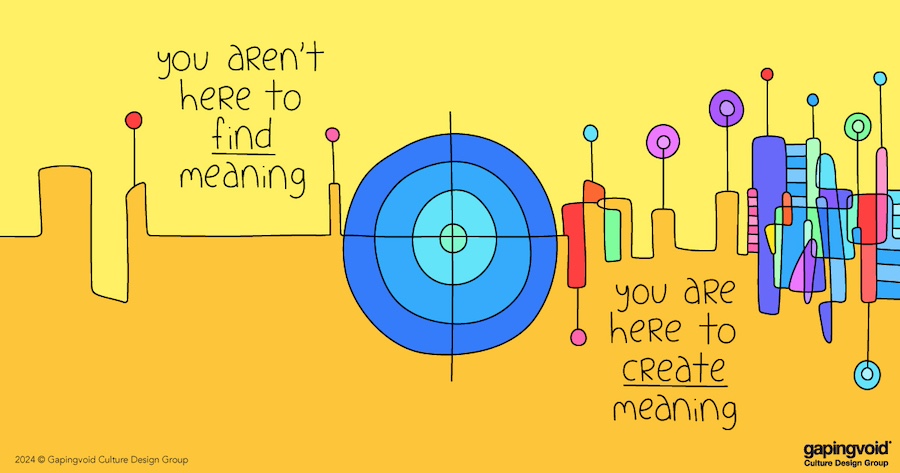As we get inundated with new knowledge and information regurgitated by large language models and generative pre-trained transformers — time for meaning-making becomes critical.
Meaning-making is the process by which we interpret situations or events in the light of our previous knowledge and experience. It is a matter of identity: it is who we understand ourselves to be in relation to the world around us.” —Dave Gurteen
Are we swimming in a world of meaninglessness?
So if you ever wonder why things feel so meaningless nowadays… well, it’s because, in a real sense, we’ve engineered a world where more and more of it is meaningless. We’re mercilessly sawing away at the connection between each other – a connection that relies on the fact that real minds are on both ends, and both are authentically trying to make meaning and share it. AI breaks the connection most powerfully, but meaninglessness is the water in which the modern world swims. —Andrew Perfors 2024-02-14
Andrew Perfors — Professor, University of Melbourne School of Psychological Sciences — describes three types of meaning-making in — The work of creation in the age of AI. [The entire post is well worth the read. I am making a note here mostly for myself.]
- Type 1. There is a creator but no audience (Individual Meaning)
- Type 2. There is an audience but no creator (Projected Meaning)
- Type 3. There is both a creator and an audience (Deep Meaning)
We all do Type 1 as we think, doodle, and reflect. Type 2 is what AI tools like GPT and LLM produce, as the ‘creator’ is merely an algorithm AKA the button. Type 3 is what you are reading here. I am the creator, reflecting on other creators by sharing these words. Given the history of my writing over twenty years here, I assume there is an audience.
What happens when people stop creating meaning and instead mostly share ‘Projected Meaning’?
Most profoundly, as someone who must live in the world, I’m troubled about living in a society where meaninglessness is the norm. Among other issues, fascism and authoritarianism thrive on meaningless because people who lack meaning turn to “strong leaders” and are easy to manipulate. Even beyond that, our information systems rely on norms of cooperation and trust that the people on the other end, the creators of messages, are authentic and real. Without that, the best case is that the system stops being used and dies entirely. More likely, while the rich might be able to create walled gardens of meaning, the system for most of us will become a swamp of falseness and distortion, a cursed transformation of humanity’s greatest asset – our cumulative cultural knowledge – into our greatest weakness. —Andrew Perfors 2024-02-14
Can we really create meaning if people are not involved? In the personal knowledge mastery workshop we cover meaning-making with activities focused on intentionality, narrating our work, and reflecting.

